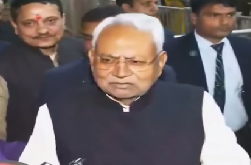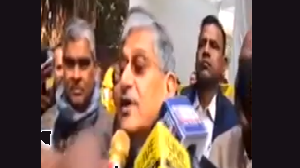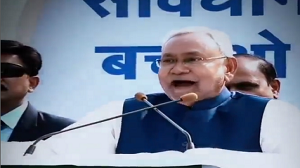Nitish Kumar’s Re-Election as JDU President
In a significant development within Bihar’s political landscape, Nitish Kumar has been unanimously re-elected as the President of the ruling Janata Dal (United) during a national executive meeting in Delhi. This decision came swiftly after the resignation of his aide, Lalan Singh, leading to weeks of frenzied speculation.

Lalan Singh’s Resignation: A Strategic Move or Signs of Discord?
Immediately after the meeting, Lalan Singh addressed reporters, dismissing any talk of a rift within the party. He emphasized that he was not harboring any resentment and denied claims of anger. However, sources suggest that Singh’s removal was influenced by perceived proximity to the JDU’s alliance partner, Lalu Yadav’s Rashtriya Janata Dal (RJD). Speculation swirls around the potential ascension of Tejashwi Yadav, Lalu Yadav’s son and the Deputy Chief Minister, to a leadership role.

BJP’s Intriguing Claims and Tejashwi Yadav’s Counter:
Adding to the political drama, Union Minister Giriraj Singh of the BJP claimed that Lalu Yadav had conveyed to him the imminent merger of JDU with RJD. Tejashwi Yadav promptly dismissed these assertions, accusing the BJP of orchestrating stories to destabilize the JDU-RJD alliance. Former Deputy Chief Minister Sushil Modi’s claim that the JDU was spreading rumors about re-allying with the BJP further fueled the political discourse.
Official Explanation for Lalan Singh’s Departure:
Officially, Lalan Singh cited the need for more time to focus on his constituency in anticipation of the upcoming elections. As a two-time Lok Sabha MP from Bihar’s Munger, Singh expressed his desire to hand over the post of party President to Chief Minister Nitish Kumar, a move readily accepted by Kumar.
Leadership Change and Its Timeliness:
The change in the JDU’s top leadership comes just months before the 2024 Lok Sabha elections, leading to speculations about Nitish Kumar’s prime ministerial ambitions. Recent events have hinted at rifts within the opposition bloc, especially after Nitish Kumar was purportedly overlooked as a potential PM candidate. The party, however, dismissed any internal discord and reiterated its commitment to uniting opposition parties against the BJP.

Past Alliances and Political Dynamics:
Critics of the JDU point to Nitish Kumar’s past decisions, particularly the abrupt termination of the alliance with the BJP in August last year following a poor performance in the 2020 elections. Despite winning only 45 seats, Nitish Kumar returned as Chief Minister with the support of the BJP’s 74 seats.
Conclusion:
The re-election of Nitish Kumar as the President of the JDU and the subsequent resignation of Lalan Singh have injected an air of uncertainty into Bihar’s political landscape. As the state gears up for crucial elections, the internal dynamics of the JDU and its alliances with other parties will undoubtedly shape the political narrative. Whether these developments signify strategic maneuvers or hint at deeper internal fissures remains to be seen. Bihar, known for its intricate political chessboard, continues to be a battleground where alliances and leadership changes wield significant influence on the state’s political trajectory.
For more related news please read – Politics
